The intro is spoiler-free, but there will be MAJOR SPOILERS after the cut.

When Alphabet Squadron was first announced, we expected it to be like the old X-Wing series from the Expanded Universe. We quickly learned that while Alexander Freed was inspired by those novels, his story would not follow the familiar pilot story arc that we had come to expect. The third and final novel in the trilogy, Victory’s Price, completes the arc of the trilogy and shows that Alexander Freed is not afraid to deromanticize the type of military sci-fi that has been part of the Star Wars DNA since the very beginning.
Though Star Wars is largely space fantasy, World War II-inspired flight sequences and especially the books and comics have drawn on swashbuckling military sci-fi themes too. Pilots are heroic rule-breakers and soldiers are valorous and noble. Even the bad guys are heroic and noble, but they’re just too darn loyal to evil politicians and wizards who misuse their talents. Freed engages with these ideas and does something different, but not just because his story subverts our expectations for the sake of surprise. No, instead, his books – especially Victory’s Price – expose traditional war story ideals to critique, delivering a more nuanced vision of war.
There are still heroes and villains, but war is brutal and traumatic. As the title makes clear: victory in war has a price, and the price is borne not just by those who didn’t make it, but by those who did. Freed isn’t the first Star Wars author to focus on the human element of warfare: the late Aaron Allston (it still hurts to write that) was exceptional at showing how characters cope with the traumas of war and deal with the personal costs of a lifetime of fighting, albeit interlaced with his trademark humor and kind storytelling. But Victory’s Price really eschews the triumphalism of space adventure, or exposes it as hollow. Many of us read the Wilfred Owen poem “Dulce et Decorum Est” in school, contrasting the “noble” language of Horace’s pro-war ode with the empty horror of the first World War – Victory’s Price reminded me strongly of that poem.
As for the Empire? The honorable soldiers, long suffering under a regime unworthy of them, no longer exist. Victory’s Price is an incredibly timely novel about what it means to sell your soul in service to evil, what brings people to do these things, and what society should do about it afterwards. Alexander Freed writes about Imperials with nuance but without getting stuck in the rut of grey moral relativism. This novel doesn’t spoon-feed or preach to the reader, but instead asks them to think and engage with deep questions. There aren’t any easy answers, but the reader who engages with Victory’s Price will find that it shines with moral clarity even underneath the blood and muck of war.
What comes after victory?
We’re going to have to discuss spoilers to get into what makes Victory’s Price so interesting, especially for a Star Wars novel. First, let’s discuss the story arcs with Hera Syndulla, Chass na Chadic, Wyl Lark, and Nath Tensent. Wyl and Nath are a pair, even after the events of Shadow Fall severely damaged their relationship. Wyl is constantly expecting more of Nath, and Nath is looking for approval in Wyl’s eyes. Their relationship, while seemingly wholesome, is also surprisingly damaging.

Wyl is your traditional reluctant hero. He was one of the 120 volunteers from his homeworld who left their planet to join the Rebel Alliance. He goes on an arc from innocent and naïve to the leader of the fighter squadrons under Hera’s command, in the absence of the disgraced Yrica Quell. He happens to be a great leader who takes the time to get to know the people under his command. By contrast – Nath is sort of shady, has his own interests, and isn’t very interested in the sacrificial heroism routine.
Through the course of the novel, Nath takes on greater and greater responsibilities. In part because he thinks it’ll help bridge the rift between him and Wyl but also because a part of Nath also feels the same desire to do the right thing. But there’s a cost to be borne for that heroism – a cost in lives, and a personal cost for the survivor. Nath has already survived the death of many of his comrades. And though this looks like a heroic growth arc – your scoundrel archetype becoming a war hero a la Han Solo – this isn’t the path Nath wants. He’s furious at Wyl for pushing this kind of heroism on him, but through Wyl’s idealism and through Wyl abandoning his command. At the end of it at all, Nath is done with everyone. He reverts back to some of his older bad habits and doesn’t go through the happy ending arc you’d expect for a war hero in a Star Wars novel. Wyl got a happy ending, but Nath didn’t.
Chass na Chadic, on the other hand, never expected a happy ending. She was lost and struggled to find herself – she joined a strange religious cult in the previous book and still clings to it in Victory’s Price. When she breaks free of the cult’s influence through gentle prodding by Nath, she reverts to her old impulses to die in a blaze of glory because she can’t imagine her life after the war. She’s one of the more damaged individuals in the group, but it was important that fighting wasn’t the answer to her struggles. War didn’t make her a complete individual – it was what came after and the idea that there would be an after that made the difference.
General Hera Syndulla’s presence loomed large in the Alphabet trilogy, but she got the most point of view scenes in this final novel. She’s lived a life of warfare and is more experienced than the rest of the people under her command – and she often thinks back on the cost of war and those she’s lost. Unlike the others, she knows full well what she wants at the end of the war: she wants to put away her guns and raise her son Jacen. She still has her own personal uncertainties and fears, but she’s been through enough to know that there comes a point where the wars have to end. She has no interest in being a career soldier in peacetime, and for a main Star Wars protagonist, it’s actually genuinely refreshing that she has decided that she’ll be done with the military and war as soon as she can be.
Imperial Gray: a fashion statement, not a moral stance
The Empire is the villain of the story, obviously. There’s no hint of gray in that whatsoever. What’s great about Victory’s Price though, is that the book strips away any hint of moral justification there was to Imperial service. The old EU had that honorable Imperial officer trope – the one who certainly was clear-eyed to what the Empire was, but was so gosh-darned dutiful and interested in service that they kept working for the fascists even as they strip-mined worlds and enslaved populations. There’s none of that in this book. Yet – yet! – Freed still gives the Imperial characters their humanity, and explores their motivations, personalities, and struggles. The pilots of Shadow Wing are sketched more three-dimensionally in this novel than the other two in the trilogy, and we see them trapped by their own decisions and forced to double-down on doing evil. It just rings true to life.
Colonel Soran Keize is the leader of Shadow Wing, and one of the most despicable characters to ever appear in Star Wars. We first hear of him through Quell’s reminiscences in Alphabet Squadron, and that he had encouraged Quell to defect because otherwise her loyalty would force her to keep committing atrocities in the name of an Empire unworthy of her service. He sounded like a nice guy, but we learn in the second novel that he definitely wasn’t – he rejoined Shadow Wing to give his former squadmates purpose, namely revenge. Turns out it’s worse than that: Keize reveals his true motivation, which was that he wanted to avoid consequences and accountability for his actions. He was apparently outraged that the New Republic might seek to prosecute former Imperials – after all, maybe some of them felt bad about it! – and decides to double down on genocide because perhaps if he commits enough genocide, there won’t be accountability?
Keize commits a second, voluntary Operation Cinder – burning down formerly Imperial worlds and killing all their civilians, and Shadow Wing goes along with him. Quell is a part of his group now because her own acts of genocide are now public knowledge in the New Republic and she doesn’t have anywhere to go. She’s still committed to bringing Keize down, but becomes a participant in his further atrocities.
We don’t need to dwell in the details of the atrocities – and I’m actually pleasantly surprised Freed has no hesitation in calling them genocidal. As I’ve said previously, Star Wars has its share of war crimes and atrocities but it’s rare that the franchise acknowledges them for what they are, and treats them with the gravity that they deserve. Moreover, we learn what kind of people are willing to perform genocidal acts – people that look normal, that look like regular soldiers. What separates Alphabet Squadron from Shadow Wing? If anything, the people of Alphabet Squadron are more broken. But it’s Shadow Wing that has the people who murder millions in the name of revenge and duty.
Even the Imperials the New Republic defends from Operation Cinder’s genocide are awful people. There aren’t enemy-of-my-enemy alliances in Victory’s Price like we saw in X-wing: Solo Command. There’s no gratitude or honor among Imperials. And if anyone’s stayed in Imperial service this long, how could there be?
Victory’s Price is incredibly timely on this point: the question of what to do with former Imperials after the war. Keize and Quell discover that the Emperor’s Messengers, who identify participants for Operation Cinder’s genocides, have been connected to a secret Imperial database that tracks every single atrocity, cruelty, or even minor injustice that everyone in the Empire’s service has become complicit in. See, the Empire was designed to make everyone a participant in acts of evil – even those who are minor pencil-pushers. Everyone is tainted by the evil of those in charge. Keize wants to wipe the slate clean, believing it an act of justice to avoid accountability. The readers can decide whether Keize is right (he’s not).

What is a harder question, though, is what to do about these people. That’s the part of Victory’s Price that hits hardest, in March 2021. The Empire is full of people who participated willingly and gleefully in atrocities, and those who just let it happen as passive beneficiaries. Can there be reconciliation without justice, or is that setting the seeds of a future conflict? Keize convinced himself that he was sparing the galaxy further conflict by preventing accountability, but his actions may just hasten it. Since we know the First Order is coming and that Imperial ideas have not gone away, the reader may ask if he was right? Again, I posit that Keize is clearly wrong but these are not easy questions.
The New Republic leadership themselves have to decide what to do with former Imperials, starting not with the pencil-pushers but with the war criminals (such as Yrica Quell). Quell gets her second chance, as you might expect for Star Wars, but the question is treated with the seriousness it deserves: has she earned a second chance? An outsider who doesn’t know her might think she hasn’t: after all, one of the best scenes in the book is when Wyl says it didn’t sit well with him to see Darth Vader cremated at Endor. Yrica’s redemption is a mirror to that: not everyone in the New Republic will know what she’s done and not everyone will agree with it. Unlike Vader, Yrica lived and because she lived, her pardon sends a message.
But Yrica didn’t escape consequences. Her actions weren’t ignored and swept under the rug. They were weighed and balanced. We may disagree — but her actions were treated with more seriousness than most Star Wars war criminals. We know the New Republic, contrary to Keize’s paranoid fantasies, will pardon many Imperials who were passive participants in the Imperial government. But it’s important that the New Republic doesn’t start its new era by letting those who committed atrocities or were responsible for commissioning them escape justice.
An incredible read
Victory’s Price is an incredible read. Not necessarily because of the events and action (though as usual, the pew pew action scenes were very good and Freed is great at getting into character’s heads), but because of the questions it was willing to raise and what it demanded of its readers. The book was also – blessedly – not as much of a traumatic read as Shadow Fall. The second book in the trilogy was a very heavy read and I did not want to go through that again. Victory’s Price is weighty in its ideas and questions, but it doesn’t weigh down the reader. Instead, it fires up the mind to think deeper questions about fictional stories and about real life.
